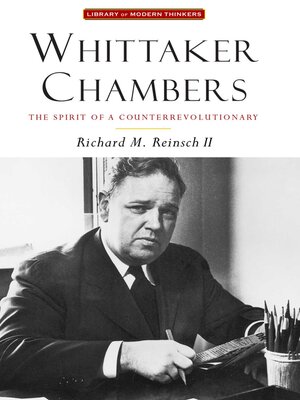
Sign up to save your library
With an OverDrive account, you can save your favorite libraries for at-a-glance information about availability. Find out more about OverDrive accounts.
Find this title in Libby, the library reading app by OverDrive.



Search for a digital library with this title
Title found at these libraries:
| Library Name | Distance |
|---|---|
| Loading... |
What Chambers Can Teach Us
Whittaker Chambers is rightly remembered for his pivotal role in the electrifying Alger Hiss spy case. But as Richard Reinsch reminds us in this volume of the acclaimed Library of Modern Thinkers series, Chambers was more than just a government informant; he was a profoundly important thinker who grappled with the nature of modern man's predicaments.
Whittaker Chambers: The Spirit of a Counterrevolutionary shows that Chambers's thought posed—and still poses—a challenge to American conservatism and its typical focus on markets and small government. In his journalism, essays, personal correspondence with the likes of William F. Buckley Jr., and landmark autobiographical tome Witness, Chambers engaged more broadly, analyzing the fundamental question of who man is and the classical and spiritual foundations of civilization.
Defying conventional thinking, Reinsch argues that the former Communist spy may have been more right than wrong when he predicted that the West would lose the Cold War. While the Soviets' Communist system did of course collapse, the spiritual and philosophical sickness that Chambers identified, Reinsch suggests, has not been cured.
Whittaker Chambers is rightly remembered for his pivotal role in the electrifying Alger Hiss spy case. But as Richard Reinsch reminds us in this volume of the acclaimed Library of Modern Thinkers series, Chambers was more than just a government informant; he was a profoundly important thinker who grappled with the nature of modern man's predicaments.
Whittaker Chambers: The Spirit of a Counterrevolutionary shows that Chambers's thought posed—and still poses—a challenge to American conservatism and its typical focus on markets and small government. In his journalism, essays, personal correspondence with the likes of William F. Buckley Jr., and landmark autobiographical tome Witness, Chambers engaged more broadly, analyzing the fundamental question of who man is and the classical and spiritual foundations of civilization.
Defying conventional thinking, Reinsch argues that the former Communist spy may have been more right than wrong when he predicted that the West would lose the Cold War. While the Soviets' Communist system did of course collapse, the spiritual and philosophical sickness that Chambers identified, Reinsch suggests, has not been cured.






